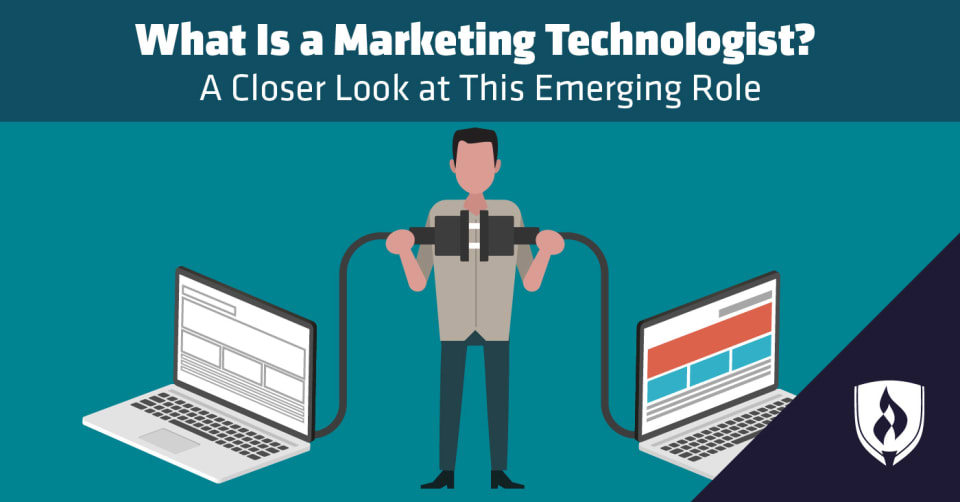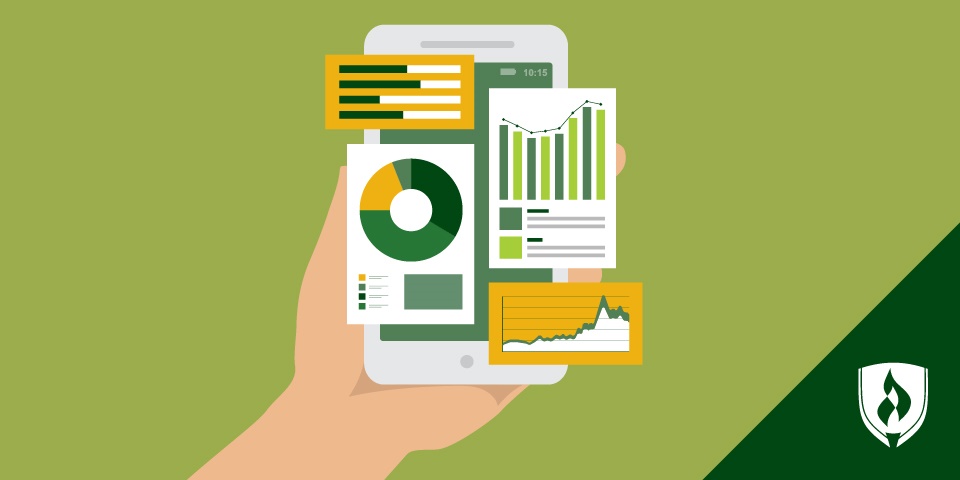What Is a Marketing Technologist? A Closer Look at This Emerging Role
By Ashley Brooks on 08/05/2019

Technology touches every part of your life, from the wireless speakers that play music throughout your house to the smartphone apps that help you stay organized. Using technology is a way of life, as far as you’re concerned. You believe technology can change lives and businesses for the better, and you’re ready to bring that passion to a career in the tech field.
You’ve heard of all the typical tech careers in software development, data analysis and cybersecurity. But the latest tech job title to land on your radar is new to you: marketing technologist.
A marketing technologist sounds like a tech position ... but it also sounds like it has a heavy focus on business and marketing. This position has captured your attention, but you’re not sure whether the job duties are a fit for your technology skills and interests.
This job title is relatively new on the technology scene, so it’s no surprise that you’re unfamiliar with the specifics of the job. We spoke with experts in marketing technologist positions to bring you the answers you need about what marketing technologists do and whether this could be the career for you.
What is a marketing technologist?
As the name suggests, a marketing technologist career lies at the intersection of marketing and technology. “A marketing technologist is a role that combines information technology (IT) with marketing skills to create a better process for ensuring marketing strategies are in line with a company’s overarching goal,” says Bailey Caldwell, online marketing manager for Frontier Communications.
The marketing field has become increasingly reliant on technology the further we’ve advanced into the digital age. “With marketing and big data being integrated so heavily in the digital age, it makes sense to have someone in this role who not only knows how to market but also how the technology works,” Caldwell says.
Sophisticated advertising platforms, websites and customer databases are all powered by technology and often communicate to one another—marketing technologists are the savvy folks who know how to tie it all together. People in this specialized role have the skills to bridge two previously separate industries—a rising combination of skills that’s needed now more than ever.
The rise of a new career: marketing technologist
Being a marketer a few decades ago was a very different career from being a marketer today. This field has traditionally focused on print advertisements, radio campaigns and TV commercials to reach potential customers. In the modern era, however, those forms of marketing often take a backseat to digital marketing.
Digital marketing encompasses everything from company blog posts and SEO to ads and analytics. The technology needed to support these marketing functions is constantly expanding, and with it the need for skilled professionals to manage it. “In the digital age, knowing how technology works within marketing is crucial. It is the driving force for revenue and helps to maximize the customer lifetime value,” Caldwell says.
As the overlap between marketing and technology continues to grow, the need for professionals who can bridge the gap between the two fields has become clearer. Marketers don’t always have the clearest picture of what their organization’s technical capabilities are, and information technology professionals don’t always have the know-how needed to translate the requirements of a marketing department into a technical solution.
What do marketing technologists do?
Professionals who work in marketing technology (or “martech” for short) often work directly with technology and analytics while using a big-picture marketing strategy to drive their actions. That said, the work of a marketing technologist will vary quite a bit from organization to organization—it’s often used as a catchall title for anyone who helps bridge the divide between marketing and IT.
“My duties vary greatly depending on the needs of the organization and where our opportunities and challenges lie,” says Wes Marsh, marketing director at BCA Technologies, Inc. His daily tasks could include tech-heavy work, like checking the scripts that track conversions to make sure everything is working properly, or marketing-focused jobs like “working in our CRM or marketing automation platforms to deliver the right message to the right customer at the right time.”
Marketing technologists often toe the line between the IT department that collects data and the marketing department that uses it, so it makes sense that working with data can also be a big part of this job. Caldwell reports that “ensuring that all the data and compliance are safe” is one of her regular job duties.
Additional marketing technology focus areas include—but aren’t limited to:
- Digital advertising platforms
- Database management and analytics
- Project management software
- Content management systems
- Marketing automation tools
Marketing technologist salary and job outlook
While this role may be a source of a lot of exciting possibilities that span multiple disciplines, there’s at least one drawback: There’s just not a lot of reliable salary information out there for this career. The salary of a marketing technologist is likely to vary substantially depending on the role—some marketing technologists may work in a role that aligns closest with IT management professionals, while others may be in a role that’s best aligned with marketing specialists.
Though the Bureau of Labor Statistics (BLS) doesn’t yet report data for this specific career, marketing professionals see this as a growing career field. “Digital marketing tools have exploded over the last decade, so much that there are now over 7,000 companies represented in the annual Chief MarTech Supergraphic,” Marsh says.
As the number of tech-powered marketing tools continues to swell, this niche focus area is likely to develop as well.
How to become a marketing technologist
A strong background in tech is what sets marketing technologists apart from other marketing careers—and that’s where the educational emphasis lies. While tech knowledge reigns supreme, this is definitely a role where there’s no “one true path” to becoming a marketing technologist. A bachelor’s degree in Data Analytics, Computer Science or Information Technology Management could all provide a viable path to becoming a marketing technologist.
Combine the skills developed in these degree programs with a general knowledge of digital marketing practices like content marketing and online ads, and you’ll be positioned with the unique skill set required to be a marketing technologist.
While the open-endedness of how to get started as a marketing technologist might be frustrating for those who like clear-cut steps, the flipside is you have plenty of options for getting there. Maybe you start with a data background and begin taking on complex marketing attribution projects. Or maybe as an IT professional, you’ll be tasked with developing network plans for a sophisticated marketing organization—and things fall into place from there.
A tech career to consider
Now that you know all the ins and outs of a marketing technologist career, you might be considering it as the position that’s the right fit for your tech passion—or at least an interesting option to pursue further down the line in your career.
One thing is clear about this up-and-coming career: You have a variety of options for reaching it. That said, it’s not always easy to figure out which tech option would best fit you. Figure out what path suits you best by using our interactive tool “Which Tech Degree Is Right for Me?”




